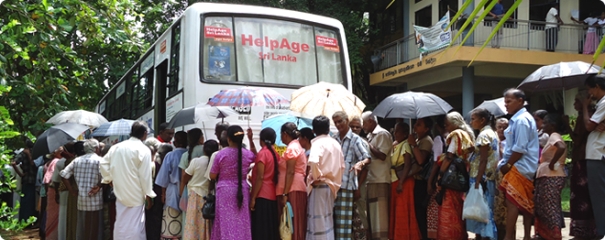Despite the positivity of a longer life expectancy, a growing ageing population presents a context of new societal challenges. It becomes imperative that communities develop strategies to facilitate an age-friendly environment, and to foster a milieu that caters for the needs of their older population. This drive towards healthy ageing is exemplified in an eye camp initiative implemented in Wellawaya, Sri Lanka.

Eye camps by HelpAge, left: (World Health Organisation 2016), middle and right images: (HelpAge n.d.)
The prevalence of impaired vision poses great challenges for Sri Lanka’s ageing population, making them dependent and vulnerable. Roughly 25% of the country’s older population experience eyesight loss due to cataracts, and an estimated 500,000 suffer in silence (HelpAge n.d.). These challenges are further escalated when a large portion of individuals are unable to pay for surgeries or are unaware of their medical condition.
The pervasiveness of these difficulties is largely experienced in Wellawaya, with a majority of its population comprised of those from low-income backgrounds. They grapple with numerous barriers, such as accessing healthcare and other related facilities. Many are unable to afford eyeglasses or pay for lenses in cataract operations. With this, HelpAge Sri Lanka inaugurated a mobile eye camp initiative to support the older population living in Wellawaya.

Eye camp buses in Sri Lanka (HelpAge n.d.)
Using a converted bus, these mobile eye camp units would travel around Wellawaya for a week, conducting free eye care services in seven pre-selected locations. The doctors of HelpAge are fully trained and qualified, and test the eyesight of those elderly patients that are vulnerable and destitute. They provide free reading and prescription glasses, as well as proper guidance on eye care. The eye camp buses are fully equipped with a range of facilities, enabling doctors to screen eyesight, conduct medical tests, and provide medical assistance. Patients also have access to free medication within HelpAge’s eye camps. For those that require cataract surgeries, they are redirected to HelpAge’s Eye Care Centre. Located in Colombo, this eye hospital conducts free cataract surgeries and supplies patients with lenses without any charge.
HelpAge demonstrates a way in which cities can adapt its services to be inclusive and accessible to older people, particularly of destitute backgrounds. Roughly 250 eye camps have been implemented across Sri Lanka, and over 2,500 elderly citizens received free cataract surgeries from HelpAge’s Eye Care Centre during 2012-2013 (Daily News 2013).
As discussed in blog-post A, blindness is prevalent across China. It becomes interesting to see how Sri Lanka has adapted its social structures to alleviate such conditions, and prompts a consideration of how a similar eye care module could exist within China. Could we implement similar eye care buses across rural areas? How can we make cataract services more accessible to elderly Chinese citizens? How can we modify Sri Lanka’s model to cater for China’s large population?
Click here to view the World Health Organisation (WHO)’s database of other global initiatives towards an age-friendly world.
References:
Daily News 2013, HelpAge imroves eye care services for needy, viewed 2 November 2016, <http://archives.dailynews.lk/2013/07/09/bus16.asp>.
HealthAge Sri Lanka n.d., Eye hospital, viewed 2 November 2016, <http://www.helpagesl.org/our_programmes/helpage_health_care.php>.
HealthAge Sri Lanka n.d., Health and eye care, viewed 2 November 2016, <http://www.helpagesl.org/our_programmes/helpage_health_care.php>.
HealthAge Sri Lanka n.d., Medical/eye camps, viewed 2 November 2016, <http://www.helpagesl.org/our_programmes/medical_eye_camp.php>.
World Health Organisation 2015, Action for ageing, World Health Organisation, viewed 2 November 2016, <http://www.who.int/ageing/events/world-report-2015-launch/ageing-health-events-toolkit.pdf?ua=1>.
World Health Organisation 2016, Blindness as a public health problem in China, World Health Organisation, viewed 2 November 2016, <http://www.who.int/mediacentre/factsheets/fs230/en/>.
World Health Organisation 2007, Global age-friendly cities: a guide, World Health Organisation, viewed 2 November 2016, <http://apps.who.int/iris/bitstream/10665/43755/1/9789241547307_eng.pdf>.
World Health Organisation 2016, Global Database of Age-friendly Practices, World Health Organisation, viewed 2 November 2016, <https://extranet.who.int/datacol/custom_view_report.asp?survey_id=3536&view_id=6301&display_filter=1>.
Images:
HealthAge Sri Lanka n.d., Medical/eye camps, viewed 2 November 2016, <http://www.helpagesl.org/our_programmes/medical_eye_camp.php>.
World Health Organisation 2016, Global Database of Age-friendly Practices, World Health Organisation, viewed 2 November 2016, <https://extranet.who.int/datacol/custom_view_report.asp?survey_id=3536&view_id=6301&display_filter=1>.

[…] Lanka’s response to blindness (post B) proposes another model. Could we readapt this initiative to account for China’s large ageing […]
LikeLike